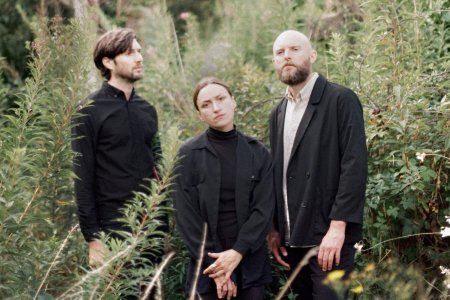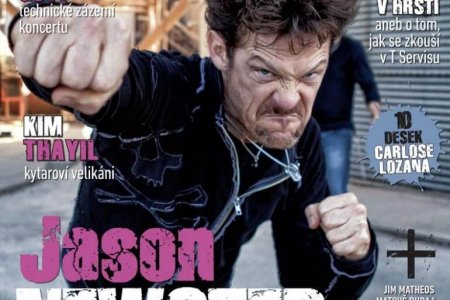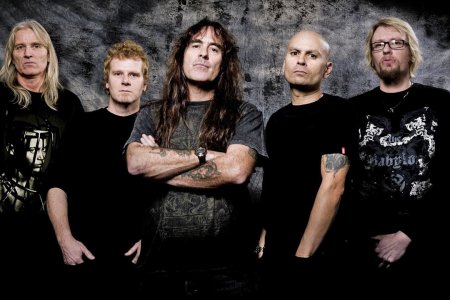Significant artistic progress, carefully protected image and an existence in their own world. This is how we could roughly summarize more than a quarter of a century in the career of Norwegian avant-garde mood masters Ulver. However, there was a breaking point in 2020. Rarely, we are not talking about current pandemic, which paradoxically helped them. Main topics of this interview were their quite openly written biography Wolves Evolve: The Ulver Story and new album Flowers Of Evil, which follows their recent synth-pop sound. „Maybe a pure photo book could be our next project, but I cannot imagine us doing a third pop album right now. It would kill us,” said Ulver’s frontman Kristoffer Rygg.
Cover photo credit: Brian Cliff Olguin
This interview was conducted primarily for October 2020 issue of Czech magazine Full Moon.
Thank you for finding time for us. How are you these days? Busy with interviews?
Quite so, yes. I just literally came back in from a two-hour face to face interview I did downtown, for a Norwegian newspaper.
I received a press preview of the book approximately two days before our call and I invested as much time, as possible to go through it. Honestly, I can truly feel a lot of time and energy was invested there, but I was mainly wondering how did Tore Engelsen Espedal deserve your trust to manage the structure of the whole book?
I would say that it’s firstly by the virtue of Tore’s writing, which is excellent. He has also become a good friend, of course, through this, and is also someone who has been lurking in the shadows for a while. He actually interviewed me back in 2007, right after Shadows of the Sun, so that’s when we first met. In the following years, he started appearing at some of our concerts and we started to talk more. By that time he was involved in a literature journal called Vagant, which has some connections to Jørn H. Sværen’s circle of associates. Book folks, basically. After these multiple “stumbling into each other” situations, we started to talk to Tore about the fact that we’d been meaning to make a book ourselves. We had some ideas on how it could be done, and he seemed quite intrigued by the prospect. So yeah, it was a quite natural meeting of minds. But obviously we knew it would be a long way from idea to finished book! The whole thing started quite casually, by just getting together one day, talking and recording a conversation about the early years, when Jørn and I met – which became the first interview in the book. We wanted to see where this would all lead, getting a feel for how the story could be told. We didn’t have a definite form in our minds at that point, but through this first interview the form of the book kind of revealed itself, I would say. Especially after he (Tore) started transcribing this first conversation, and then reading through it together, making some comments and adjustments here and there. Then he obviously started writing some of his own reflections. So it became quite clear, okay, this is a doable course of action. It took us two years, all in all to get it done.
I really enjoyed the interactions between you, Jørn and Tore in the early phase of the book: “I remember you were wearing a Burzum shirt. It implied that you were somewhat initiated.”
(Laughs) That’s right. We’re just sticking to whatever we had talked about, or remembered, even the most nerdy details. Obviously there are things which were edited or taken out. While other things might have been added as memories came back or we double-checked certain dates or whatever. From an editorial perspective though, you never really know what’s interesting and what’s not to the outside world. Sometimes we might have given some topics too much space, I don’t know. But in the end it feels like it’s telling our story, from the rough and rudimentary, till present day. And in a fairly digestible way, I hope.
In the foreword section, you thanked Tore (Engelsen Espedal) for his patience. In what sense did you mean it?
Well, it has been one hell of an effort from his side, you know. A rather meticulous and time-consuming process. It’s not easy now, in 2020, when music business is not the one with the most extravagant budgets, especially not for something like this – a book. So yeah, he has put hundreds and hundreds of hours into it, and with a “labour of love” attitude, rather than based on the prospect of big winnings or anything like that. He’s been very patient, indeed, and put his heart and soul into making it all manifest the best way possible. I mean, we all did, but without Tore this book would not be, quite simply.

It felt kind of nice to take things more down to the ground floor
When I was going through the book, I was impressed with a number of old pictures. Were there some items from photos or posters, you are really happy that they were discovered? Something like: “Damn, I thought these ones were lost!”
Funny thing is, some of them I thought were lost. Back in the day, we went to develop a film in a shop and sometimes you’d make doubles, sometimes you didn’t. Besides, we often used to send the original photos out to different fanzines. Ideally, we’d keep a duplicate for keepsakes, but it was certainly not always the case. It is funny when you compare it to these days, where you have so many pictures, on your phone, the cloud, or in Dropbox. There are so many things out there, on Instagram, straight from phone – but then a lot of it’s not necessarily reproducible in a book. Anyway, fortunately I still had some old photos in my collection, and a bunch of our friends provided many more, so there has been an aspect of going through every nook and cranny to collect stuff in a good enough quality, get it properly scanned and such. But naturally those early years the image bank is more sparse, because the photos we had are coming from those few times when we had a disposable camera with us, or the 4 / 5 times we organised a full photoshoot. Whereas today, we have a rather big number of photos documenting our live shows, backstage and such. And here it was more a matter of making the right selection. You know, from the last ten years or so, we have a pretty big archive. Maybe that could be our next project – a pure photo book.
Humanization Of The Lone Wolves
I follow Ulver for a couple of years now. I mainly enjoy the latest albums, but I am continuously going through various phases of your career. However throughout the whole discography I can feel one strong common aspect and that’s a strong motivation to maintain and even partially control unique mystique image of the band. Were you in some point nervous that this massive package of information, might affect your long term effort?
Well, it is scary to an extent, and we obviously feel more exposed than ever by doing something like this. But then again, you cannot release a book without exposing yourself, I think. And maybe the world needs a bit of open arms right now, if you know what I mean. At least a bit more, compared to what we’ve shared so far. (Laugh) There is an element of humanising the mythology a bit. We were certainly not going for several esoteric essays or whatever, which is a direction one could have gone, I suppose. But I think at this point the mythology is there and always will be to some extent. For us it felt kind of nice to take things more down to the ground floor, so to speak. At least to try to share some of our impression of the world and the music business and what it’s like to be in this band, our intentions and reasons for doing this for so many years. We are all just people, after all. The mythology is, you could argue, self-created or controlled, but this is also something that happens outside of itself, us, with the passing of time and how other people write about music or interpret things in posterity. So, yeah, I don’t know, you tell me, if we found a decent balance, between allowing the human aspect to shine through and not necessarily being completely buck naked. (Laugh) I guess there is still a distance there, even if we are opening the door more than before.

I don’t think we are keenly tuned in to what is going on outside of our own small world, to be honest. Maybe not that interested either.
It is a huge amount information to digest, but it is easy to dive into it and get inspired. I mainly enjoyed the fact you are loyal to your lone wolves philosophy and you give a reader incredible perspective of what was happening in the 90’s in Norway as well as during your continuous future experiments. You are informing, you are aware of what is happening around you, but you still went your own way.
Well, thank you so much for saying that. That’s a relief. And yes, if we do something, we try to do it properly, as we say. (Laugh) Seems like you’re having a good take away from it all. That’s cool.
Throughout the years I always enjoyed seeing a mention of Ulver in rather unexpected locations. I think I came across a review of one of your albums in Czech version of lifestyle magazine Maxim. Quite well written btw. What were some of your most unique discoveries?
Hmm, I guess that would be the infamous Nattens Madrigal posters in The Sopranos. (Laugh) It became sort a meme within the online metal community, still going strong to this day. But it happens… just yesterday, I saw Flowers of Evil reviewed in Classic Pop Magazine, and about a week ago Matt Skiba (Blink-182) put an Ulver logo in one of his paintings and posted about it online. Other times, it can happen that our songs end up in some major Hollywood film, which is always strange, or at least not something I would have imagined when I was a teenager. But I guess Ulver is now a sort of a many-headed beast with tentacles stretching into even stranger avenues. It is also an opportunity to not be so niche oriented, which is think it’s quite ok and fair after all this time. After all, is it that strange that this album gets some attention in the so-called ‘mainstream’? In some way, it’s almost stranger to me how we after over 20 years of not playing metal we largely still get covered in metal press. (Laugh)
Many-Headed Beast
If we can be slightly more philosophical, what would be for you the biggest benefit of following the philosophy of a lone wolf? Your music was always very helpful for me during melancholic night walks, but at the same time I respect you were going your own way. Which is something I can relate to for being half Czech/half Yugo. I lived in both countries and I never quite fitted, but I made my peace with that.
I guess the same can be said for us, yeah, we made our piece with it. We are sort of eternal outsiders. (Laugh) But, I guess it’s tied to a certain form of contrariness as well, a reluctance to just go with the flow. Not because it’s interesting for us to be “anti” in itself, but just because we are quite restless, curious creatures. Not easily comfortable in any sort of box or notion of who we are supposed to be, how we are supposed to feel, think or last but not least expectations or “demands” as to what we are supposed to create. Our world is very small world. In Ulver there are four people at the core and a couple more guys around, an extended family, but it’s quite a small world. And I don’t think we are keenly tuned in to what is going on outside of our own small world, to be honest. Maybe not that interested either. (Laugh) That might explain this sense of alienation that we feel and which you can maybe hear in our music. Does that make sense?
It does. Especially if I look at your latest albums. When I am trying to shortly describe Ulver, to someone from a general public, it’s always very attractive to show the progress from black metal early days to avant-garde 80’s synth pop. Yet it makes sense.
Thank you very, very much. I just want to add one thing. You know, this mythos, that we started with black metal and progressed since, would not be complete without mentioning a lot of things that happened in the meantime, changes in personnel, changes of heart. That’s kind of what the book is for, it explains many of these movements and shifts, and maybe puts it all in a more natural light, I don’t know. The main breaking point of course happened around the album Themes from William Blake’s The Marriage of Heaven and Hell from 1998. All of these people who are in Ulver today came with that album, and after, they were not members of our early day’s line-up, and in fact have no background in metal at all. Well, except for Jørn and myself, of course. Sometimes we’ll get questions, you know, if we could not play some of the old stuff in our current live set-up. And the answer is always no. For one very obvious and simple reason. These people, the current Ulver would not have a clue how to play that stuff, and that goes for me as well. (Laugh) I haven’t belted out a black metal rasp since 1996! Besides, it would feel pretty misplaced, even to me, to play a song from Bergtatt on the Caesar tour. (Laugh) But, let’s imagine someone who in recent time let’s say discovered Nattens Madrigal (1997) and is now trying to understand this band. They don’t see this big time-gap, or the internal clockwork… It’s so long ago. Almost a quarter of a century ago, I guess in anyone’s life a lot of things would change within such a timespan.
Looking at Perdition City (2000) or Shadows of the Sun (2007) which were my crucial bases for further discoveries, I feel a very strong connection to the latest albums, especially within melancholy. Is this sort of music in general useful for you to deal with personal challenges, including relationships? The cover of Solitude from Black Sabbath at the end of Shadows of the Sun seems as an ideal choice.
Thanks for saying that. Yes, there is a sadness in our music, of course, but I don’t wish to talk too much about personal losses or regrets, beyond what is already evident in our music and lyrics. And yeah, I also feel that Solitude thematically fits that album, including the mood of the song itself. That album deals with loss as its overall theme. Loss of real things, in life, relations and such, but also a loss of illusions, one might say.
Generation Gap
While reading a book, there were three things which stand out and even repeated multiple times: State of doubt, generation issues and a dreamy romanticism. If we look at Russian Doll from a latest album, you mention she was born in 1989, which is one year after me. As you were commenting many times in the book on the challenges of your generation, I have a feeling from lyrics, you had a strong motivation to understand challenges of my generation as well. Am I right?
Very good question. Big question actually. I suppose we are all looking back. You are looking back and someone in his or her twenties is looking back as well. Sometimes you look back to times before you were born. I think it is key to look at history to understand what’s going on. Today it must be very difficult to come of age, especially because of the amount of information and disinformation! It must be very tough thing to navigate. From the perspective of my generation, we are adapting to that to some extent, but we are also bound in our old ways. And maybe not so attuned to all these modern communication platforms and what’s ‘hip’, if you know what I mean. Which is sometimes very hard to understand for someone in my age. (Laugh) But an overarching thing in terms of an Ulverish social awareness is to tap into the relentless pulse of pain running through the world, past and present. Because the world is, well, a tough place. And I think a lot of people are having a hard time right now. But people had hard times before. Of course, there will always be positive things, song, laughs, wine and dance, but I guess it’s important for us to project the hard truths through our music, simply to show these things to people, to remind us that there is still a long way to Eden. That’s, I guess, as good as I can answer this question.
I agree with your statement and I do hope you will keep doing that.
We shall see. (Laugh) We have been working continuously for so many years now. It comes to a point where you start to think: “Maybe we’ve said all we had to say.” At this point it’s hard to tell, to be honest with you.
This is a concern I keep in my head all the time. But I believe, it’s not your case yet. The Assassination of Julius Caesar was extremely important to me, followed by a great EP Sic Transit Gloria Mundi. When I first heard about Flowers of Evil, I had concerns how would you do. But you did the most practical thing and took things to a darker levels. Little Boy is an epic track I enjoyed in the nature, in the depths of Czech Republic and A Thousand Cuts is a great relationship track and an ideal ending. You said, you had doubts, but I was wondering, if you hope, you will continue this direction?
The reason we kind of decided to keep this sound was more like a productional or ‘professional’ interest, first and foremost. Almost like an internal studio challenge, how far can we take this form? In any case, we were not aiming for a stylistic departure, and the line-up and our set-up has been largely the same. We see our last two albums – let’s use a Norwegian analogy – as a two-headed troll. (Laugh) Flowers of Evil is zooming closer in on more recent times, I think, whereas Caesar is a bit more antiquity, talking about lyrical themes here. But yeah, sonically, it’s a lot of painstaking work, to get an album like this up to par… So many hours trying to record things the right way, hone every little detail, tweak the sounds, or samples, and yet not go overboard with the layers, all those kind of concerns that matter if you’re going for a big and shiny beast. (Laugh) At the end of the process like this we are completely drained and empty. I also feel that we might have taken this form musically and lyrically to its logical conclusion. So whatever we will or won’t do next – I don’t really know at this point – it might be necessary for us to go somewhere else, just to survive it internally. Because… I mean, it’s always hard to make an album, but it’s really hard to get the ‘pop thing’ right. It’s a long way from an initial idea, through lyrical scraps and notes, and how those have to fit in the overall rhythm and to a final product, more so than anything we’ve ever done before. I cannot imagine us doing a third pop album right now. It would kill us. (Laugh)

It must be very tough thing to navigate today, because of the amount of information and disinformation!
Therefore I would like to ask for the end, what are you doing now to get yourself from that exhaustion phase and to recharge your batteries? Let say nature or diving deeply into some book…
I usually bike a Norwegian mile (ten kilometres) or two every day. I also did some running in recent years, but not so much these days, as I just had a back surgery. Man, I’m getting old. (Laugh) We finished this album half a year ago, and we were supposed to go out and do this big ambitious tour, but it all fell through because of the pandemic. This, I think, has given us a bit of time socially to find back to a good, safe space in this overall negative space we collectively find ourselves in. Just getting together, creating some sounds, playing around, but also just talking about future things, about what we could or we shouldn’t create. Baby steps, for now, you know… So, it’s kind of changed the internal clock a bit, I think. Had we been on a tour, we would be mentally in a quite tense place and there’s reason to think we would be ready to take a break from each other after. (laugh) These are very strange times though, as you can’t really go places, or gather too many people together, so it becomes more about what’s near and dear. Like kids, my family and my extended family, which is my band. It’s a good time to reflect, take a long walk under the sun, read some books, sleep, dream. No one knows exactly what will come out of all this.






